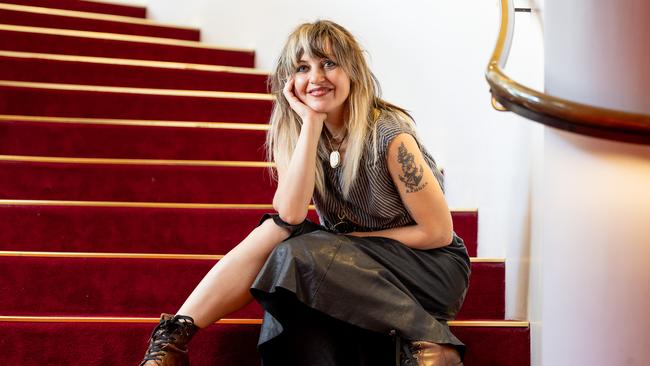Hadestown writer Anaïs Mitchell on protest and the power of collaboration
Her Tony Award-winning musical hitdraws on Ancient Greek myths but underneath the surface folk singer-songwriter Anaïs Mitchell has something important to say.

Your Tony Award-winning musical hit Hadestown has been playing in Sydney, and is about to start its Melbourne run. What’s it like for you as an American to hear it with an Aussie accent? We’ve done the show in the States, in London and now here, and in every case it just didn’t feel right to make people pretend to be different, or sound different than they do. The producers and I want the show to feel of the place where it’s being performed.
It tells the story of Orpheus and Eurydice, and Hades and Persephone, in a kind of post-apocalyptic New Orleans. When did the Ancient Greeks first get under your skin? As a child I had the D’Aulaire’s Book of Greek Myths, and I can still see the pages in my head. The story of Orpheus is the one that lodged in my heart way back when.
The kids today still love these myths - why do you think they have such timeless appeal? They enter our psyche in a way that you don’t even know where they came from. It’s like stuff from the Bible that you know and absorb, whether you’ve read the Bible or not.
Hadestown is billed as a love story, but with its allusions to climate change and wealth inequality it can feel like a protest song. How do you describe it? When I first started writing it I was right out of college, and I was very much under the influence of protest music – early Bob Dylan stuff, Pete Seeger, Woody Guthrie. I was going to protests; whatever we were protesting back then, I was there. I was also inspired by the Depression era, but in the end, I lived with this music for such a long time that eventually I felt less comfortable writing political songs, so things changed.
So the work intentionally became less political? I just got interested in the emotions underneath it all. Take Hades – his tragedy, his compulsion, his excess, the possibility of transformation for him, that his heart could be touched. That’s what’s baked into the show.
The song ‘We Build The Wall’ addresses a hypothetical wall built to separate two societies - and you wrote that well before any talk of Donald Trump’s border wall. I know! I remember when I wrote it back in 2006 I was thinking about climate change and I remember asking myself, if large parts of the world became uninhabitable and if there were all these people looking for higher ground, looking for a place of relative wealth and security, and if I happened to be in one of those places of relative wealth and security, who among us wouldn’t, at some level, be scared and want to be behind a wall of some kind?
You must admit it is rather uncanny. It’s one of those songs that came so quickly I almost didn’t know what it meant when I wrote it. So, when that language started to come out of the mouth of a political figure that no one expected to wind up in the presidency... I think what it speaks to is (Trump) was and is tapping into something way more ancient than him. The idea of a wall is kind of a language that has been used before for hundreds of years because it’s effective on people who are feeling scared or vulnerable. That’s all that he’s doing.
You had a successful career as a solo folk singer, garnering a Grammy nomination, but now perform in the band Bonny Light Horseman. What do you love about collaboration? My relationship with Josh [Kaufman] and Eric [D Johnson] is magical. There’s a safe-to-fail quality – and for any collaboration to work, you need to know you can throw out an idea that’s not gonna stick. It’s part of the creative process and if you can’t handle it, it’s hard to get to the good stuff.
Is that what made theatre director Rachel Chavkin – your Hadestown collaborator – such a good foil? Rachel isn’t like anyone else I’ve ever worked with. She expects and demands the best. In her, I needed a tough-love collaborator to say, “Here’s what you need to do,” and not take any pushback from me.
Did you give her grief? We were in the trenches on this show for years. Early on, she came with a laundry list of dramaturgical notes. I was weary; I said, “I’ve been living with this show for seven years.” She said, “If we’re gonna work together, you’ll have to find a way to move past your fatigue.” That was real talk.
On Broadway the show came with a diverse cast, anchored by two female creatives. The current rhetoric out of the US is that DEI (diversity, equity and inclusion) is dead. How does that make you feel? Those guys don’t speak for me. The early versions of Hadestown were not as diverse, just because it came out of the backwoods of Vermont, where I live – it’s a super white state. But when we moved to more diverse rooms I found it to be beautifully human; it felt right, and it felt rich creatively.
So, are you now the biggest thing to come out of Vermont? No! That’d be Bernie Sanders ... or maybe Ben & Jerry’s ice cream... The place is a kind of paradise that transcends partisanship. There are town meetings where people argue about how to spend the school budget, but at the end of the day, if your car is in a ditch the neighbour is going to help drag it out.
Hadestown moves to Melbourne from May 8






To join the conversation, please log in. Don't have an account? Register
Join the conversation, you are commenting as Logout